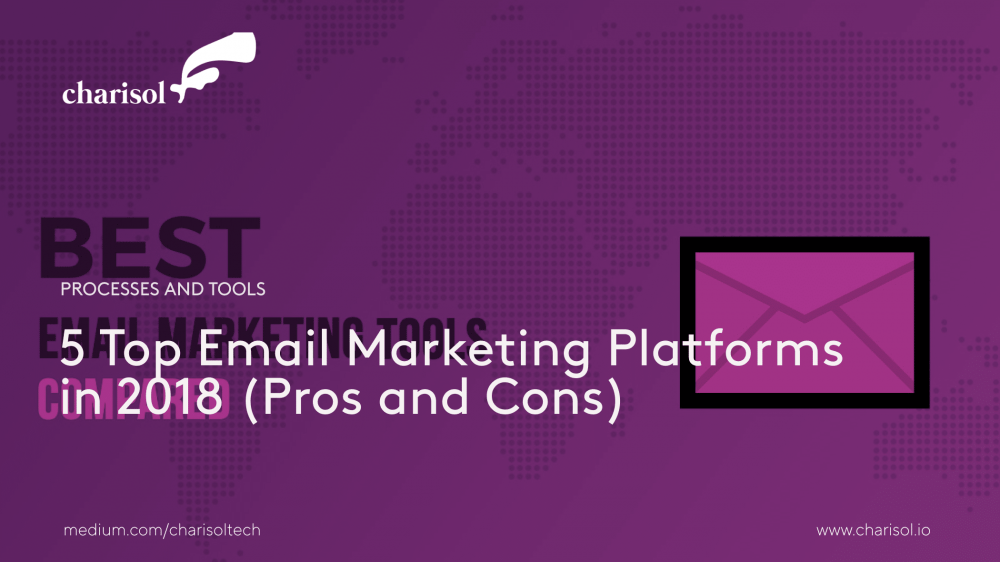Email marketing — the practice of targeting consumers and advertising your business services via electronic mails — may not be a front runner in the business advertising segment today. But thanks to the modern digital craze, it still holds its place and no business, (virtual or physical) may fully thrive without it.
In fact studies show email marketing and e-newsletters are the second most effective marketing tool for conversion generation (coming right behind SEO). Also, email marketing tops the marketing tools used by small companies with a remarkable 54% lead.
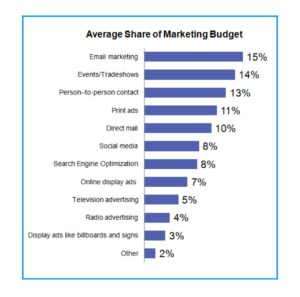
From all indications, marketing your products/services, or running a campaign by email is an efficient, fluid and cost-effective way to reach new customers and retain existing ones. According to a report by Mapps Consumer Views, email marketing does influence customers’ purchasing decisions. A good email marketer can employ it to nurture customer relationship post-transaction. You can also encourage future purchases by creating targeted and customised messages.
The rewards of using email marketing today are endless. Another benefit is that it is measurable. When you execute a sales campaign or brand awareness strategy with email marketing, you can afterwards, analyse and assess the campaign’s performance by using analytics software. This will help you make improvements and adjustment in your future campaigns and marketing tactics.
Suggested read: How to Monitor and Effectively Deliver Your Email Campaigns
Despite that email marketing could be a big boon to your business, it might be cumbersome to manage hundreds of thousands of contacts and customise your messages to suit each one of them. Fortunately email marketing platforms/companies have got you covered. They serve as conduits through which users can access basic email marketing tools and services. Many of them come with extra features, like analytics software tools that help optimise the benefits users derive from their campaigns.
Ever wondered what superpowers are in charge of making these services available, and the best to adopt? To save you the worry, we have compiled a list of the top email marketing platforms every business owner should check out. These platforms have been selected based on their efficiency overtime, with each catering to generic business’ email marketing objectives.
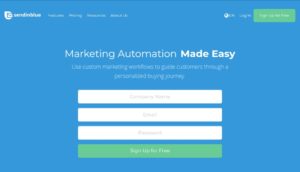
SendinBlue is one of the top email marketing platforms that possibly has all you need to get started in email marketing, making it a great choice for small businesses. Its major attractive features, as shared by other predominant platforms, include:
- A landing page builder
- Automated email marketing option
- You can design your email with provided, easy-to-use email templates
- Transactional email and SMTP
- You can send SMS with its SMS sending option
- You also get to organise your contacts, tag, and move them between the lists
- The service is well integrated with third-party lead generation tools.
Pros
- If you want to do more of optimised email marketing in less time, SendinBlue is a prime option to consider.
- Its unique features and tools make it a superb choice for small and medium sized business owners, especially since you get access to both email marketing and transactional email services
- It’s primarily easy to use. You can familiarise yourself with its features and options in a short period of time.
Cons
- This platform is not popularly recognised, yet, in the email marketing sphere.
2) GetResponse
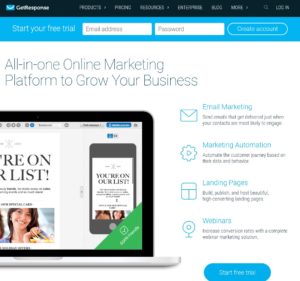
GetResponse’s significant advantage has been its simplicity. It is very easy to use, especially for beginners. Hence, it is best for small business owners who are just learning the ‘game’ of email marketing. Its features (which can also be found in other similar platforms) include:
- Automated marketing tools
- An easy-to-use drag-and-drop building tool that allows you manage your contacts, organise them into groups, create effective campaigns and content that suits each group.
- Appealing email templates
- A landing page builder
- Webinars; a feature that includes interactive tools and guide to help you create a webinar, invite people and organise tasks and activities for the webinar.
- API – an application programming interface. >> See explanation here
- It is integrated with third-party tools like Google Docs, SalesForce etc.
- It comes with engaging responsive forms, autoresponders, and A/B tracking (an analytics tool).
Pros
- GetResponse’s dashboard is organised and well-structured. There are also prompts that guide you to all the sections on the platform so you can get utilise all its provided tools
- The platform is more of an online marketing suite of tools than a basic email platform. Thus it is must for business owners that want to optimise all email marketing has to offer and need required tools.
- You can reach the platform’s support service via email, phone and even live chat. Also its help section is full of free instructional and helpful learning material.
- You also get a month’s free trial
Cons
- For businesses that want a simple email marketing platform, they may find its options and tools quite a lot to navigate through.
- Its free trial runs for a month, after which you have to pay for its services at a basic rate $15/month.
Suggested Read: 3 Crucial Reasons Your Digital Marketing Leads aren’t Converting

MailChimp’s interface is superbly-designed with great tools and awesome support for all kinds of business owners. Its features offer you nearly all you need for your email marketing tactics. It is also perfect for WordPress users. The platform integrates well with WordPress, tons of e-commerce platforms and analytics that target your customers based on previous sales, preferences, and behavior. Its distinctive features include:
- A location manager option that allows you to set up delivery times based on user’s timezones and setup segmenting based on a geolocation tool.
Pros
- A major advantage of using MailChimp is its free plan; a forever free plan that allows you to send 12,000 emails for 2,000 subscribers. This free plan includes automation, built-in sign up forms, report and data insight, and campaign creation without coding required.
- Its paid plan comes quite low at a basic rate of $10/month. This grants access to email delivery by timezone, unlimited sending, predicted demographics, and chat support
- It practically teaches you how to create campaigns with its “create campaign” icon and basic steps to go about it
Cons
- Asides the basic rate, going for an higher plan is quite expensive. However, if your organisation is nonprofit, you can benefit from MailChimp’s 15% discount for nonprofit organisations.
4)DRIP

Drip — beloved by bloggers, marketers and even e-commerce enterprises — comes “bearing a gift” of a broad range of tools, with integration addons for all predominant website builders (such as WordPress). Via this feature, you can easily add sign up forms to your website and capture more leads. Its unique offers include:
- A marketing automation tool that is super intelligent with smart grouping options and other features that you tailor your content to reach specific audiences in your lists. An illustration is its main screen that presents your current stats and important pieces of data about your lists
- You can send emails to subscribers based on pre-set triggers
- Facebook Lead Ads integration
- The platform also offers an option that allows you to create series of emails that are part of a single campaign
Pros
- An easy-to-use, interactive and ‘homely’ interface that users can get comfortable around
- A free trial account for about 100 subscribers
- A support service that includes Webinars, automation training, detailed course, free guides and, of course, live chat.
Cons
- Its service comes really pricey at $41 a month.
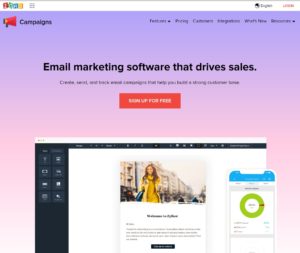
Zoho Campaigns, true to its name, is built to basically to create, send, and track email campaigns. Thus, it is perfect for small and medium-sized businesses. The platform is part of a range of Zoho products and connects with other applications of the Zoho product range. So if you’re already using related Zoho apps then Zoho Campaigns is a prime choice for you.
If you aren’t, then consider getting one or two other Zoho apps, such as ZohoCRM, to optimise the platform’s services. Its distinct features include:
- Automated email marketing with individualised campaigns.
- A permission-based access
Pros
- An awesome free plan of 12000 emails per month for a whopping 2000 subscribers.
- Its basic paid plans cost little, at $5 per month.
- It also offers a monthly subscription and a pay-as-you-go plan that’s priced based on email credits.
Suggested Read: Effective Digital Marketing Services for B2B Startups
Cons
- The platform may need additional related products to enable you access the full range of email marketing tools.
From the above juxtaposition, it is clear that most email marketing platforms are tailored to suit particular kinds of businesses more than others, while others offer generic services for all kinds of businesses.
However, there is no single one that provides a one-size-for-all email marketing service. Choosing the right tool or platform for your business depends on its unique needs, and that is where we come in to help.
Here at Charisol, our tech-savvy digital and social media marketers are available round the clock to guide you towards choosing the best email marketing platform for your business. Our versatile marketers are also rich in strategies and tactics to run lead-converting and cost-effective email campaigns.
Would you like some professional hands to handle your email marketing? Try us out today!

